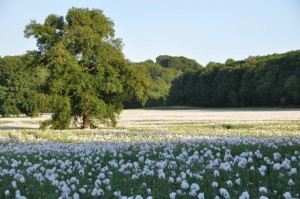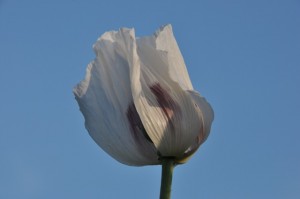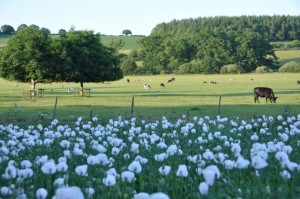 What is the unusual crop in the Park, I hear you ask, well the perceptive amongst you will remember when we grew the same in Wynchard two years ago, it is a medicinal crop, which after harvest will be taken to a factory in Edinburgh, to be processed into useful medicines for pain relief. Interestingly, the same factory spends half the year processing poppies, and for the other half of the year they process daffodil bulbs, to extract a drug called galantamine, which is used to slow the onset of Altzheimer’s disease. It is sometimes prescribed for people with mild to moderate Alzheimer’s. The earlier treatment is started, the more effective it may be. About half of patients who try the drug show slight improvements.
What is the unusual crop in the Park, I hear you ask, well the perceptive amongst you will remember when we grew the same in Wynchard two years ago, it is a medicinal crop, which after harvest will be taken to a factory in Edinburgh, to be processed into useful medicines for pain relief. Interestingly, the same factory spends half the year processing poppies, and for the other half of the year they process daffodil bulbs, to extract a drug called galantamine, which is used to slow the onset of Altzheimer’s disease. It is sometimes prescribed for people with mild to moderate Alzheimer’s. The earlier treatment is started, the more effective it may be. About half of patients who try the drug show slight improvements.
The drug slows the breakdown of acetylcholine, a chemical that aids memory by transmitting messages between brain cells. It also acts on nicotine receptors in the brain.
Sadly, we have no plans to begin growing daffodils, as our ground is far too stony, and a good deal of specialised machinery would be required. I did once work on a daffodil farm in my youth, however the bulbs there were for the garden centre market, not drugs, and a in freezing cold March, I clearly recall bending over in a field, with numb fingers, picking daffodils, and trying, hopelessly, to put a tiny rubber band around each bunch of 10 flowers.
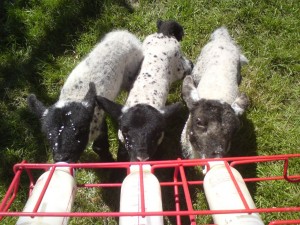 Our small woolly friends in the garden are growing steadily, and are as noisy as ever, there is no chance of them letting us forget to feed them. Lambing is now over for another year, and the lambs are growing well, using the solar panels on their backs. That must be what is doing it, because there isn’t very much grass. The dry weather is still a worry, so little rain has fallen since the beginning of April, I can’t really believe how much the crops have actually grown.
Our small woolly friends in the garden are growing steadily, and are as noisy as ever, there is no chance of them letting us forget to feed them. Lambing is now over for another year, and the lambs are growing well, using the solar panels on their backs. That must be what is doing it, because there isn’t very much grass. The dry weather is still a worry, so little rain has fallen since the beginning of April, I can’t really believe how much the crops have actually grown.
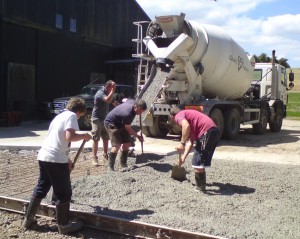 We have been hard at work this week laying concrete, trying to tidy up a muddy area around the grainstores, where grain lorries churn up the ground in wet weather, and if you spilt any grain from the forklift bucket, it was impossible to sweep up, because it simply fell in the quagmire. No more, it will all be a pristine clean concrete area from now on. It can be a bit risky laying concrete in very hot weather, because it goes hard so much more quickly, so you have to work quickly while it is still nice and sloppy. Once laid, we have to keep spraying water on it to stop it cracking.
We have been hard at work this week laying concrete, trying to tidy up a muddy area around the grainstores, where grain lorries churn up the ground in wet weather, and if you spilt any grain from the forklift bucket, it was impossible to sweep up, because it simply fell in the quagmire. No more, it will all be a pristine clean concrete area from now on. It can be a bit risky laying concrete in very hot weather, because it goes hard so much more quickly, so you have to work quickly while it is still nice and sloppy. Once laid, we have to keep spraying water on it to stop it cracking.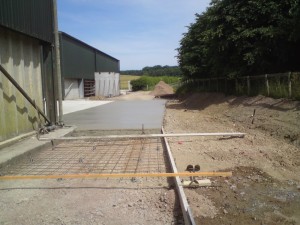
The other more seasonal job underway at the moment, is the dreaded cleaning of the grainstores, a rather taxing job which none of us is very keen on, fortunately this year, we have a keen team of students helping us out with this. Grainstore hygiene is very important, we try to make sure we remove all old grain, dust and reside from the previous harvest, and all surfaces are hoovered, so there is as little chance as possible of contamination of the new intake with bugs or mites. We will then spray out the stores with a disinfecting bug killer.
Next week we plan to begin pulling wild oats, there seem to be rather too many in the winter barley this year, for some reason, but most of the wheat looks pleasingly clean. All the crops are quite short this year, due to dryness, so at least the oats should be easier to spot. The annual straw sale next week should give us an idea how bad the local livestock farmers feel the winter fodder situation is, many have had greatly reduced silage yields, and so some may try to bulk up mediocre results with straw. Most barns are empty too, little carryover remains from the extended winter and very cold early spring.
Harvest should be with us in less than a month now, so my apologies if we don’t get a chance to make a broadcast next time. 